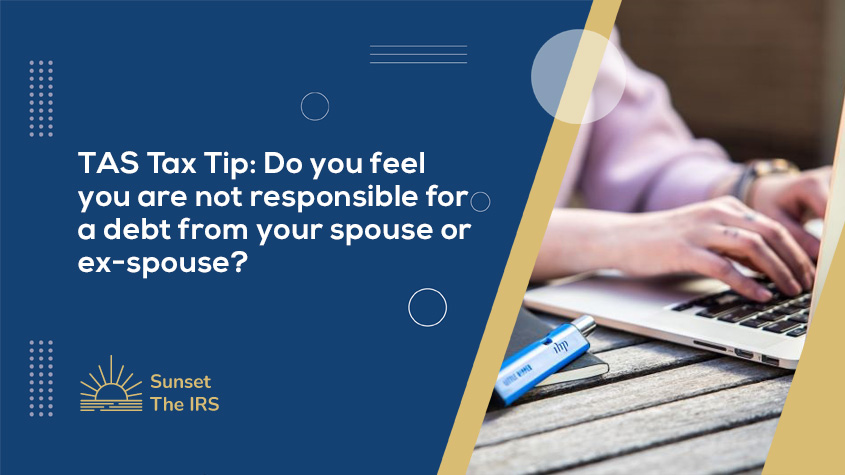TAS Tax Tip: Do you feel you are not responsible for a debt from your spouse or ex-spouse?

Gustavo Lopez
Writer

If you file a joint return and your spouse has a debt (this could be a federal, state income, child support, or spousal support debt), the IRS can apply the payment of one of these debts, which is known as "compensation". The agency may also take collection action against you for tax debt you and your spouse owe, such as filing a federal tax lien notice or issuing a tax. However, if you are not legally responsible for the past due amount, you may still be entitled to receive your share of the refund or claim a joint and several release of liability, depending on the facts of the situation. "Joint and several liability" means that each taxpayer is legally responsible for the entire debt, even if they are divorced after filing a joint tax return.
If you believe you are not responsible for the debt, there are two ways to apply for relief:
Injured Spouse Claim
You can request to be treated as an injured spouse if you have filed a joint tax return and all or part of a refund is taken to pay a debt that belongs only to your spouse and not to you. See the injured spouse page for detailed instructions on how to file this claim and what information is needed. We also have a short video that explains what injured spouse means and when to file a claim.
Innocent Spouse Relief
For cases involving only individual employment or self-employment income taxes, by applying for Innocent Spouse Relief, you may be considered for exemption from liability for paying taxes, interest, and penalties, if your spouse (or former spouse) misreported items or items that were omitted from their tax return.
Note: Homework taxes, individual shared obligation payments, corporate taxes, and the labor tax trust fund recovery penalty are not eligible for the innocent spouse exemption.
The three types of innocent spouse relief available are:
Innocent Spouse Relief
By applying for Innocent Spouse Relief, you can be relieved of the responsibility to pay taxes, interest, and penalties if your spouse has done something wrong on their tax return.
Disclaimer Separation
With this type of relief, you allocate (split) the tax understatement (plus interest and penalties) on your joint return between you and your spouse (or former spouse).
Just Relief
If you are not eligible for Innocent Spouse Relief or Separation of Liability, you may still be exempt from liability for taxes, interest, and penalties through Just Relief.
Each type of relief has different requirements. Three types of relief at a glance Compare the rules for these three types of relief. You can also refer to Innocent Spouses Questions and Answers for more information on these types of aid.
If you are filing an Innocent Spouse Compensation claim, but the IRS denies your claim and you still disagree, see Appealing an Innocent Spouse Determination for next steps.
More help:
In any of the above situations, if you have taken the necessary steps and filed the correct complaint information in a timely manner, but still cannot resolve the issue, please check if you are eligible for help from the Taxpayer Advocate Service.

